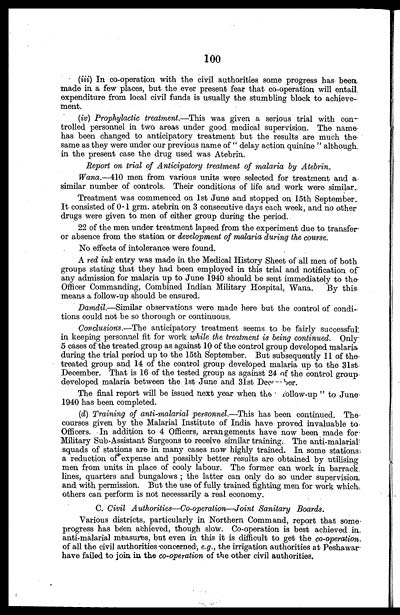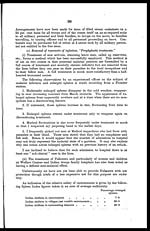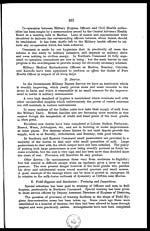Medicine - Institutions > Army health reports and medical documents > Annual report on the health of the army in India > Volume II [2], Part I - Annual report on the health of the army in India for the year 1939
(302) Page 100
Download files
Individual page:
Thumbnail gallery: Grid view | List view

100
(iii ) In co-operation with the civil authorities some progress has been
made in a few places, but the ever present fear that co-operation will entail
expenditure from local civil funds is usually the stumbling block to achieve-
ment.
(iv ) Prophylactic treatment. —This was given a serious trial with con-
trolled personnel in two areas under good medical supervision. The name
has been changed to anticipatory treatment but the results are much the
same as they were under our previous name of "delay action quinine" although
in the present case the drug used was Atebrin.
Report on trial of Anticipatory treatment of malaria by Atebrin.
Wana. —410 men from various units were selected for treatment and a
similar number of controls. Their conditions of life and work were similar.
Treatment was commenced on 1st June and stopped on 15th September.
It consisted of 0.1 grm. atebrin on 3 consecutive days each week, and no other
drugs were given to men of either group during the period.
22 of the men under treatment lapsed from the experiment due to transfer
or absence from the station or development of malaria during the course.
No effects of intolerance were found.
A red ink entry was made in the Medical History Sheet of all men of both
groups stating that they had been employed in this trial and notification of
any admission for malaria up to June 1940 should be sent immediately to the
Officer Commanding, Combined Indian Military Hospital, Wana. By this
means a follow-up should be ensured.
Damdil. —Similar observations were made here but the control of condi-
tions could not be so thorough or continuous.
Conclusions. —The anticipatory treatment seems to be fairly successful
in keeping personnel fit for work while the treatment is being continued. Only
5 cases of the treated group as against 10 of the control group developed malaria
during the trial period up to the 15th September. But subsequently 11 of the
treated group and 14 of the control group developed malaria up to the 31st
December. That is 16 of the tested group as against 24 of the control group
developed malaria between the 1st June and 31st December.
The final report will be issued next year when the
1940 has been completed.
(d ) Training of anti-malarial personnel. —This has been continued. The
courses given by the Malarial Institute of India have proved invaluable to
Officers. In addition to 4 Officers, arrangements have now been made for
Military Sub-Assistant Surgeons to receive similar training. The anti-malarial
squads of stations are in many cases now highly trained. In some stations
a reduction of expense and possibly better results are obtained by utilising
men from units in place of cooly labour. The former can work in barrack
lines, quarters and bungalows; the latter can only do so under supervision
and with permission. But the use of fully trained fighting men for work which
others can perform is not necessarily a real economy.
C. Civil Authorities—Co-operation—Joint Sanitary Boards.
Various districts, particularly in Northern Command, report that some
progress has been achieved, though slow. Co-operation is best achieved in
anti-malarial measures, but even in this it is difficult to get the co-operation,
of all the civil authorities concerned, e.g., the irrigation authorities at Peshawar
have failed to join in the co-operation of the other civil authorities.
Set display mode to: Large image | Zoom image | Transcription
Images and transcriptions on this page, including medium image downloads, may be used under the Creative Commons Attribution 4.0 International Licence unless otherwise stated. ![]()
| Permanent URL | https://digital.nls.uk/74987969 |
|---|




